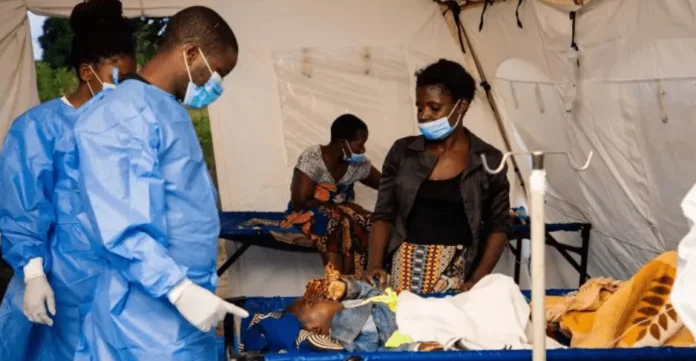The national department of health has confirmed that two cases of cholera have been detected in the Limpopo province.
Health Department spokesperson Foster Mohale said both cases were imported from Zimbabwe.
The adult male patients are aged 43 and 27 years old.
Ground zero region
Mohale said the first case was confirmed in the Musina sub-district in Vhembe District.
He said the 43-year-old patient tested positive and has since been treated and discharged from Musina hospital.
Mohale said the 27-year-old man was presented at the Hellen Franz hospital in the Capricorn District Municipality. He had symptoms of abdominal cramps, watery diarrhoea and vomiting, which started on January 11 2024.
“The patient travelled to Zimbabwe on December 9 2023 and returned to South Africa on January 10 2024. His health condition is stable and [he is] still in isolation at the hospital. His contacts (persons he came into contact with) were identified.
“The local outbreak response team has been activated to conduct further investigations and provide health education to the contacts,” said Mohale.
Public urged to be vigilant
Mohale said Deputy Health Minister Dr Sibongiseni Dhlomo has urged members of the public to be vigilant and maintain personal hygiene as the country grapples with cases of cholera.
“The country remains on high alert of possible imported cholera cases from the neighbouring Zimbabwe. The country is currently battling the outbreak of the disease, which has so far claimed over 200 lives,” said Mohale.
“The department, in collaboration with the Border Management Authority, has intensified health screening at Beitbridge border post. This is to mitigate against the imported cholera cases from Zimbabwe.
“The deputy minister thanks these suspected cholera patients for being honest with their travel history and full co-operation with health officials. He appeals to all those with travel history to cholera outbreak areas to do the same. This is in order save lives and prevent further transmission to other people,” said Mohale.
Travellers cautioned on use of public facilities
Dhlomo said travellers should not use suspected contaminated surfaces in public places.
“We say to all travellers along N1 from Musina and other parts of the country, please avoid using known or suspected contaminated surfaces. Especially in public places. And wash hands thoroughly with soap before handling food or after using the bathroom. [This will help] to prevent possible infection,” said Dhlomo.
Mohale said all people who experience cholera-like symptoms are also urged to present themselves to the nearest health facilities without delays. These symptoms are stomach cramps, diarrhoea, dehydration and vomiting. Whether they travelled to cholera endemic countries and areas or not.
“Never drink water from unsafe sources such as rivers, dams, streams, unless boiled or disinfected first,” said Mohale.
Hammanskraal outbreak
In May last year, there was an outbreak of cholera in Hammanskraal, north of Pretoria. More than 20 people died as a result.
In July last year, an independent investigation by the Water Research Commission was commissioned. The commission is an entity of the department of water and sanitation. It found that the source of the cholera outbreak in Hammanskraal remains unknown.
In November last year, public protector Advocate Kholeka Gcaleka released an investigation report into the Hammanskraal situation. Her report stated that residents in Hammanskraal are not receiving clean water that is suitable for human consumption. It said this was due to a partially functional and/or dysfunctional state and condition of the Rooiwal waste water treatment works.
Remedial action
On her remedial action, Gcaleka said City of Tshwane Mayor Cilliers Brink must table a copy of the investigation report. This has to be done through the speaker of the municipal council for discussion. It also urged the mayor to receive and consider the implementation plan developed by the municipal manager.
The plan has to set out steps or measures to be taken by the city to address deficiencies and shortcomings at Rooiwal. The report gave the mayor 60 calendar days to implement this recommendation.
Water and Sanitation Minister Senzo Mchunu was instructed to take appropriate steps or measures as he may deem necessary. The minister is to work collaboratively with the City of Tshwane to address the water challenges in Hammanskraal.
Mchunu was also given 60 days to act on the recommendation.



